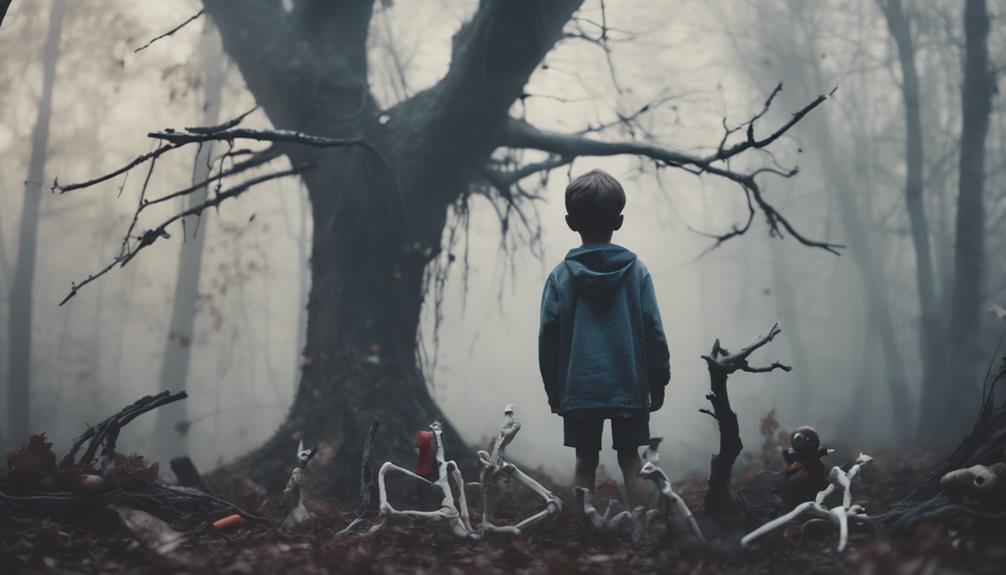Men who experience childhood abuse often carry profound psychological scars into adulthood, which can greatly impact their adult relationships. These scars can manifest as feelings of inadequacy, self-criticism, and unworthiness, leading to patterns of dysfunctional love and toxic relationships. In some cases, they may unknowingly seek partners who resemble their abusive caregivers, perpetuating cycles of abuse and infidelity. However, by acknowledging and addressing childhood wounds, survivors can break free from these toxic patterns and develop healthier relationships. As they explore the complexities of their past, they'll uncover the keys to transforming their relationships and achieving a more fulfilling future.
Key Takeaways
• Childhood abuse leads to psychological scars, including feelings of inadequacy, self-criticism, and unworthiness, affecting adult relationships.
• One in three abused men seek partners resembling their abusive caregivers, perpetuating cycles of dysfunctional love and toxic relationships.
• Unresolved childhood trauma influences partner selection and relationship dynamics, leading to depression, anxiety, and psychological issues.
• Adult survivors of childhood abuse may perpetuate cycles of abuse and infidelity, unknowingly seeking relationships that replicate childhood trauma.
• Acknowledging and addressing childhood wounds is essential to breaking free from toxic patterns and creating healthier adult relationships.
Psychological Scars of Abuse
Men who experience childhood abuse often struggle with profound psychological scars that can persist into adulthood. These scars manifest as feelings of inadequacy, self-criticism, and unworthiness. These emotional wounds can have a substantial impact on their relationships, as they may struggle to form and maintain healthy connections with others.
Higher levels of psychopathology and depression are common among abused men, further exacerbating their relationship difficulties. Childhood abuse can also lead to emotional numbness and dissociation, making it challenging for them to establish trust and emotional intimacy with their partners.
These psychological scars can have long-lasting effects, influencing their relationships and overall well-being if left unaddressed.
Patterns of Dysfunctional Love

One in three abused men may unconsciously seek out partners who resemble their abusive caregivers, perpetuating a cycle of dysfunctional love. This phenomenon is rooted in the psychological effects of childhood abuse, where men may struggle with feelings of inadequacy and self-sabotage relationships.
They may be drawn to partners who recreate the familiar drama and emotional intensity of their childhood experiences. This pattern of dysfunctional love can lead to toxic relationships, infidelity, and even abuse. It's essential for abused men to recognize these patterns and seek professional help to break the cycle of dysfunction.
Childhood Wounds in Adulthood

Childhood wounds can resurface in adulthood, manifesting as dysfunctional relationships, emotional unavailability, and self-sabotaging behaviors that hinder meaningful connections. As men struggle to form and maintain healthy relationships, they may unknowingly repeat patterns of abuse or infidelity. This can lead to feelings of inadequacy, low self-esteem, and emotional numbness, making it difficult to trust and be vulnerable.
Childhood trauma can influence their partner selection and relationship dynamics, often seeking out familiar, yet toxic, relationships. Unresolved trauma can also lead to depression, anxiety, and other psychological issues. It's essential for men to acknowledge and address their childhood wounds to break free from these destructive patterns and cultivate healthier, more fulfilling relationships.
Cycles of Abuse and Infidelity
Many adult survivors of childhood abuse unknowingly perpetuate cycles of abuse and infidelity in their relationships, often replicating the toxic dynamics they experienced during their formative years. This perpetuation can manifest in various ways, including:
- Selecting partners with similar traits to their abusers, as a way to recreate familiar emotional patterns
- Engaging in infidelity as a coping mechanism to deal with unresolved trauma and emotional numbness
- Unconsciously seeking relationships that mirror the drama and intensity they experienced in their childhood.
Breaking Free From Toxic Patterns

Three key steps can help survivors of childhood abuse break free from toxic patterns in their adult relationships.
First, acknowledging and accepting the past is essential, allowing men to recognize the impact of childhood abuse on their relationships.
Second, seeking professional help, such as therapy, can aid in understanding and overcoming the effects of abuse.
Lastly, developing self-awareness and self-reflection enables individuals to identify and break free from toxic patterns.
By taking these steps, survivors of childhood abuse can develop healthier relationships, free from the negative influences of their past.
This transformative process requires dedication, but ultimately empowers individuals to create more fulfilling and meaningful relationships.
Frequently Asked Questions
Can Childhood Abuse Affect a Man's Sexual Performance in Adulthood?
Research suggests that childhood abuse can indeed affect a man's sexual performance in adulthood. This can manifest in various ways, including erectile dysfunction, premature ejaculation, or a decrease in sexual desire.
The emotional trauma and psychological distress associated with childhood abuse can lead to difficulties in sexual intimacy, as men may struggle with feelings of vulnerability and trust in their relationships.
Do Men Who Were Abused as Children Always Repeat Abusive Patterns?
Men who were abused as children don't always repeat abusive patterns. While childhood trauma can influence adult behavior, it's not a guarantee that they'll become abusers themselves.
In fact, many survivors of abuse actively work to break the cycle of abuse and create healthier relationships. With professional help and a willingness to confront past trauma, individuals can overcome the impact of childhood abuse and develop more positive relationship dynamics.
How Can a Partner Support a Man Who Has Experienced Childhood Abuse?
When advocating for a partner who's experienced childhood abuse, it's crucial to understand the complexities of their trauma and its impact on relationships.
A supportive partner can create a safe space for open communication, validating their partner's emotions and avoiding judgment.
They should educate themselves on the effects of childhood abuse, recognizing triggers and emotional responses.
Can Childhood Abuse Lead to Addiction or Substance Abuse in Men?
Childhood abuse can indeed lead to addiction or substance abuse in men, as they may turn to substances as a coping mechanism for unresolved trauma. This self-medication can provide temporary escape from emotional pain, but ultimately worsens the situation.
Research suggests that men who experienced childhood abuse are more likely to develop substance use disorders, with some studies indicating a higher risk of opioid addiction.
Are Men Who Were Abused as Children More Likely to Experience Anxiety?
Men who were abused as children are more likely to experience anxiety due to the profound impact of trauma on their emotional and psychological well-being.
Childhood abuse can lead to heightened anxiety in men, as it often results in difficulties with emotional regulation, trust issues, and feelings of vulnerability.
This anxiety can manifest in various ways, including social anxiety, phobias, or generalized anxiety disorder, and can greatly impair daily life and relationships.
Conclusion
In a cruel twist of fate, the very experiences meant to nurture and protect can ultimately destroy.
Childhood abuse, a supposed sanctuary, can spawn a lifetime of toxic relationships, infidelity, and emotional turmoil.
Yet, in acknowledging this painful legacy, men can shatter the chains of their traumatic past, breaking free from the cycles of abuse and infidelity that have haunted them for so long.
By confronting the demons of their youth, they can forge a new path, one that leads to healthier, more fulfilling relationships, and ultimately, a chance to reclaim their lives.









